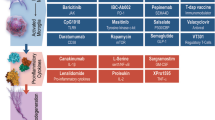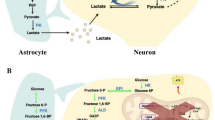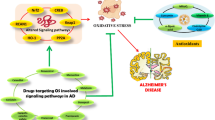Abstract
The intake of the polyunsaturated fatty acid docosahexaenoic acid (DHA) or n-3 fatty acid has been associated with reduced risk of Alzheimer’s disease (AD) in epidemiological reports. However, the underlying mechanism remains to be elucidated. Here, we report that exogenous DHA administration could protect neurons against Aβ oligomer-induced injury both in vitro and in vivo, partly through reducing the endoplasmic reticulum (ER) stress, and preventing cell apoptosis. In transgenic fat-1 mice with enriched ω-3 fatty acids, Aβ oligomers induced fewer neuronal losses, when compared to wild-type (WT) mice. We conclude that endogenous DHA are neuroprotective in pathogenesis processes of AD.




Similar content being viewed by others
References
Haass C, Selkoe DJ (2007) Soluble protein oligomers in neurodegeneration: lessons from the Alzheimer’s amyloid beta-peptide. Nat Rev Mol Cell Biol 8(2):101–112
Krafft GA, Klein WL (2010) ADDLs and the signaling web that leads to Alzheimer’s disease. Neuropharmacology 59(4-5):230–242
Kuo YM, Emmerling MR, Vigo-Pelfrey C, Kasunic TC, Kirkpatrick JB, Murdoch GH et al (1996) Water-soluble Abeta (N-40, N-42) oligomers in normal and Alzheimer disease brains. J Biol Chem 271(8):4077–4081
Roher AE, Chaney MO, Kuo YM, Webster SD, Stine WB, Haverkamp LJ et al (1996) Morphology and toxicity of Abeta-(1-42) dimer derived from neuritic and vascular amyloid deposits of Alzheimer’s disease. J Biol Chem 271(34):20631–20635
Walsh DM, Tseng BP, Rydel RE, Podlisny MB, Selkoe DJ (2000) The oligomerization of amyloid beta-protein begins intracellularly in cells derived from human brain. Biochemistry 39(35):10831–10839
Walsh DM, Klyubin I, Fadeeva JV, Cullen WK, Anwyl R, Wolfe MS et al (2002) Naturally secreted oligomers of amyloid beta protein potently inhibit hippocampal long-term potentiation in vivo. Nature 416(6880):535–539
Gong Y, Chang L, Viola KL, Lacor PN, Lambert MP, Finch CE et al (2003) Alzheimer’s disease-affected brain: presence of oligomeric a beta ligands (ADDLs) suggests a molecular basis for reversible memory loss. Proc Natl Acad Sci U S A 100(18):10417–10422
Lesne S, Koh MT, Kotilinek L, Kayed R, Glabe CG, Yang A et al (2006) A specific amyloid-beta protein assembly in the brain impairs memory. Nature 440(7082):352–357
Kalmijn S, Feskens EJ, Launer LJ, Kromhout D (1997) Polyunsaturated fatty acids, antioxidants, and cognitive function in very old men. Am J Epidemiol 145(1):33–41
Kalmijn S, Launer LJ, Ott A, Witteman JC, Hofman A, Breteler MM (1997) Dietary fat intake and the risk of incident dementia in the Rotterdam study. Ann Neurol 42(5):776–782
Morris MC, Evans DA, Bienias JL, Tangney CC, Bennett DA, Wilson RS et al (2003) Consumption of fish and n-3 fatty acids and risk of incident Alzheimer disease. Arch Neurol 60(7):940–946
Barberger-Gateau P, Letenneur L, Deschamps V, Peres K, Dartigues JF, Renaud S (2002) Fish, meat, and risk of dementia: cohort study. BMJ 325(7370):932–933
Lim WS, Gammack JK, Van Niekerk J, Dangour AD (2006) Omega 3 fatty acid for the prevention of dementia. Cochrane Database Syst Rev. 2006 (1):Cd005379
Fotuhi M, Mohassel P, Yaffe K (2009) Fish consumption, long-chain omega-3 fatty acids and risk of cognitive decline or Alzheimer disease: a complex association. Nat Clin Pract Neurol 5(3):140–152
Kang ZB, Ge Y, Chen Z, Cluette-Brown J, Laposata M, Leaf A et al (2001) Adenoviral gene transfer of Caenorhabditis elegans n--3 fatty acid desaturase optimizes fatty acid composition in mammalian cells. Proc Natl Acad Sci U S A 98(7):4050–4054
Kang JX, Wang J, Wu L, Kang ZB (2004) Transgenic mice: fat-1 mice convert n-6 to n-3 fatty acids. Nature 427(6974):504
Fa M, Orozco IJ, Francis YI, Saeed F, Gong Y, Arancio O (2010) Preparation of oligomeric beta-amyloid 1-42 and induction of synaptic plasticity impairment on hippocampal slices. J Vis Exp 14:(41). doi:10.3791/1884
Klein WL (2002) ADDLs & protofibrils—the missing links? Neurobiol Aging 23(2):231–235
Hsia AY, Masliah E, McConlogue L, Yu GQ, Tatsuno G, Hu K et al (1999) Plaque-independent disruption of neural circuits in Alzheimer’s disease mouse models. Proc Natl Acad Sci U S A 96(6):3228–3233
Nilsberth C, Westlind-Danielsson A, Eckman CB, Condron MM, Axelman K, Forsell C et al (2001) The ‘Arctic’ APP mutation (E693G) causes Alzheimer’s disease by enhanced Abeta protofibril formation. Nat Neurosci 4(9):887–893
Prasad MR, Lovell MA, Yatin M, Dhillon H, Markesbery WR (1998) Regional membrane phospholipid alterations in Alzheimer’s disease. Neurochem Res 23(1):81–88
Soderberg M, Edlund C, Kristensson K, Dallner G (1991) Fatty acid composition of brain phospholipids in aging and in Alzheimer’s disease. Lipids 26(6):421–425
Song JH, Miyazawa T (2001) Enhanced level of n-3 fatty acid in membrane phospholipids induces lipid peroxidation in rats fed dietary docosahexaenoic acid oil. Atherosclerosis 155(1):9–18
Johnson EJ, McDonald K, Caldarella SM, Chung HY, Troen AM, Snodderly DM (2008) Cognitive findings of an exploratory trial of docosahexaenoic acid and lutein supplementation in older women. Nutr Neurosci 11(2):75–83
Freund-Levi Y, Eriksdotter-Jonhagen M, Cederholm T, Basun H, Faxen-Irving G, Garlind A et al (2006) Omega-3 fatty acid treatment in 174 patients with mild to moderate Alzheimer disease: OmegAD study: a randomized double-blind trial. Arch Neurol 63(10):1402–1408
Kotani S, Sakaguchi E, Warashina S, Matsukawa N, Ishikura Y, Kiso Y et al (2006) Dietary supplementation of arachidonic and docosahexaenoic acids improves cognitive dysfunction. Neurosci Res 56(2):159–164
Chiu CC, Su KP, Cheng TC, Liu HC, Chang CJ, Dewey ME et al (2008) The effects of omega-3 fatty acids monotherapy in Alzheimer’s disease and mild cognitive impairment: a preliminary randomized double-blind placebo-controlled study. Prog Neuropsychopharmacol Biol Psychiatry 32(6):1538–1544
van de Rest O, Geleijnse JM, Kok FJ, van Staveren WA, Dullemeijer C, Olderikkert MG et al (2008) Effect of fish oil on cognitive performance in older subjects: a randomized, controlled trial. Neurology 71(6):430–438
Quinn JF, Raman R, Thomas RG, Yurko-Mauro K, Nelson EB, Van Dyck C et al (2010) Docosahexaenoic acid supplementation and cognitive decline in Alzheimer disease: a randomized trial. JAMA 304(17):1903–1911
Acknowledgments
This study is supported by the Macao Science and Technology Development Fund (018/2013/A1), matching grant project MRG003/SHX/2014/ICMS, and multi-year research grant, university of Macau, MYRG122 (Y1-L3)-ICMS12-SHX and MYRG110 (Y1-L2)-ICMS13-SHX (H.S.). The study is also supported by “Hundred Talents program,” “Qing Lan Project” of Nanjing Normal University, and Jiangsu Provincial Natural Science Foundation (No. BK20140917) (T-F.Y.).
Conflicts of Interest
None declared.
Author information
Authors and Affiliations
Corresponding authors
Rights and permissions
About this article
Cite this article
Tan, Y., Ren, H., Shi, Z. et al. Endogenous Docosahexaenoic Acid (DHA) Prevents Aβ1–42 Oligomer-Induced Neuronal Injury. Mol Neurobiol 53, 3146–3153 (2016). https://doi.org/10.1007/s12035-015-9224-0
Received:
Accepted:
Published:
Issue Date:
DOI: https://doi.org/10.1007/s12035-015-9224-0




